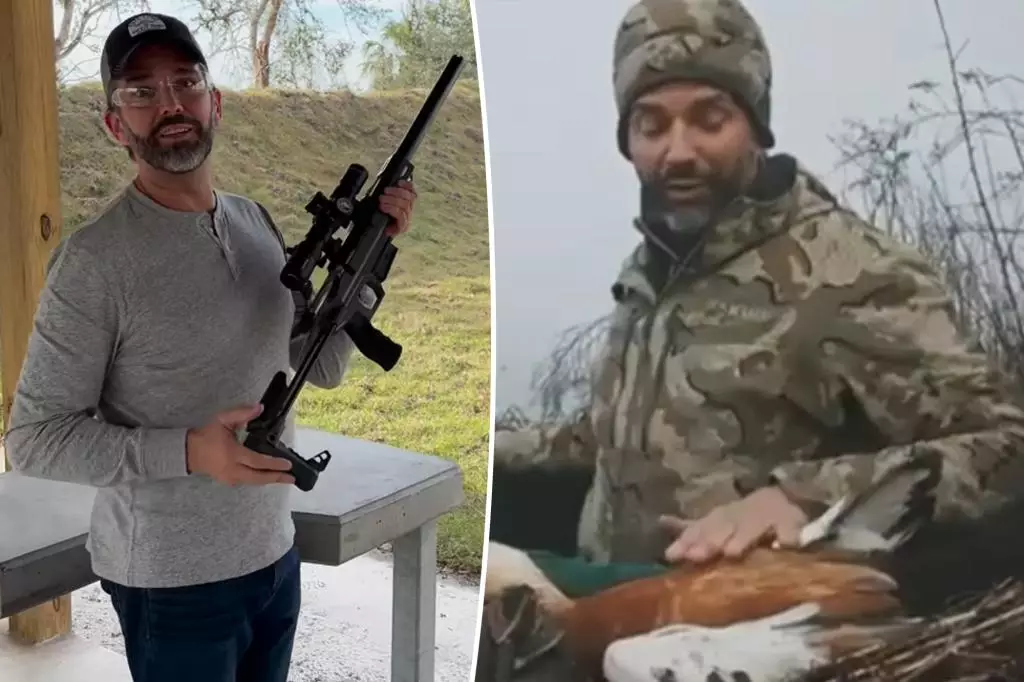The social media era has amplified the scrutiny public figures face, especially when engaging with contentious activities like hunting. This reality was recently highlighted in a controversy involving Donald Trump Jr., who now finds himself at the center of a firestorm after a duck hunting expedition in Italy sparked outrage among animal rights activists and politicians alike. The incident raises numerous questions about legality, animal conservation, and the implications of celebrity actions in delicate ecosystems.
During a holiday getaway in December near a picturesque lagoon outside Venice with his girlfriend, Bettina Anderson, Trump Jr. participated in a duck hunt that has since proved divisive. A video from this trip surfaced, showcasing Trump Jr. and others actively hunting ducks, but along with the typical flurry of criticism, it featured footage of a rare bird whose identification is now under scrutiny. Observers quickly pointed to the unusual coloration of one duck in particular, speculating that it could potentially be a Ruddy Shelduck, a species not commonly found in Europe.
The uproar was further exacerbated by local Italian politicians calling for an investigation into the matter. They allege that Trump Jr. may be in violation of local hunting laws, which could result in significant repercussions. Italian regulations dictate that hunting is primarily reserved for residents, and without the appropriate license issued by local authorities, it raises the question of whether Trump Jr. had any right to partake in the hunt.
Upon hearing the news, Italian animal activists rallied against Trump Jr.’s actions, characterizing them as irresponsible and potentially detrimental to wildlife conservation efforts. Their feelings of indignation are magnified by the perception that wealthy foreigners are sidestepping local hunting regulations while potentially endangering rare species.
Green party representative Andrea Zanoni emphasized the legal restrictions imposed on foreign nationals, expressing that Trump Jr.’s actions, if proven true, contravened Italian law intended to protect regional wildlife. Such sentiments reflect a broader frustration towards affluent celebrities who can sometimes navigate legal loopholes to fulfill their leisure pursuits.
These criticisms underscore an emerging theme in animal rights advocacy: the need for accountability, irrespective of an individual’s public stature. As activists become increasingly vocal, the incident highlights the cognitive dissonance present in society; the admiration of celebrity lifestyles often stands in stark contrast to environmental ethics.
In response to this storm of criticism, Trump Jr.’s camp insists that all the necessary permits were obtained and that the hunting took place in a legally sanctioned area where several other hunting parties were also present. Surabian, a spokesperson for Trump Jr., articulated his commitment to adhering to local laws and regulations surrounding hunting. He mentioned that the confusion surrounding the rare duck may stem from various factors, suggesting it could have been shot by another party or discovered post-mortem by their hunting dog.
This assertion raises crucial discussions about the responsibilities that accompany hunting as a recreational activity. Advocates argue that hunters, particularly those in positions of significant public visibility, such as Trump Jr., must set positive examples of ethical hunting practices. The nuances of hunting regulations can be complex, and the line between legal and illegal can sometimes devolve into gray areas, particularly when species exist on the brink of endangerment.
As the backlash continues, several Italian politicians have not only demanded investigations but also called for new measures to prevent similar incidents in the future. Luana Zanella, an Italian MP, asserted that if Trump Jr. is found culpable, he should face the same consequences as any Italian citizen. Such statements suggest a determination to uphold the integrity of local laws, especially regarding wildlife protection.
The controversy encapsulates a broader societal conversation about the ethics of hunting and the privileges granted to celebrities in light of their wealth and fame. With increasing literacy on conservation issues among the public, incidents like this could lead to a reevaluation of hunting norms and regulations, potentially ushering in stricter enforcement measures.
While the fate of Donald Trump Jr. regarding this incident remains uncertain, it’s evident that public figures must recognize the weight of their actions. The delicate dance of hunting, legality, and conservation ethics is more pronounced than ever in today’s digital age. Whether the backlash proves consequential or merely a brief uproar, it signals a growing sensitivity toward the environment and the need for responsible citizenship among all, irrespective of one’s status. The incident not only invites scrutiny but also serves as a poignant reminder of the interconnectedness of our actions and their implications for both wildlife and public perception.
